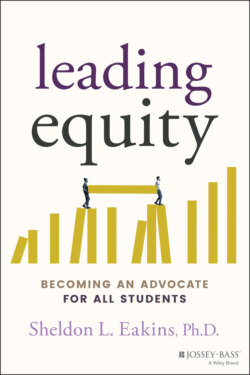Читать книгу Leading Equity - Sheldon L. Eakins - Страница 9
Not Doing Anything Is Not Doing Anything
ОглавлениеI saw the disappointment in her face because I responded, “Well, I didn't do anything. I left.” At that moment, I came to the realization that not doing anything was not doing anything. Does that make sense? Not doing anything was not doing anything at all. Let me interject. Sometimes, we have opportunities when we overhear something or witness something. We may be in a staff meeting, and the things that are being said and discussed make us feel like we should raise our hand and speak up. We may think, Let me stop this. However, sometimes, our positionality and confidence may hinder us. I feel like the phrase imposter syndrome gets thrown round a lot. We start to wonder, Who am I to be in this space?
I'll never forget those five words the professor said to me, “And what did you do?” Those words had me thinking, Oh man, I didn't do anything. I thought I did the right thing by not responding and just walking away. What I realized is I could have said something. I could have said something such as, “You know what? I know I'm new here. I know I'm not even staff, but I must be honest. I'm a little disappointed because I'm really excited about being an educator. I'm a candidate right now, and it's kind of disappointing to hear the negativity being spoken to our students.” I could have left it there. I could have gone even further and said, “I haven't been here long, and I don't know the student's back story. However, he's a human being, and I think he deserves a chance. If we take the time to create that relationship, maybe we wouldn't feel that way.”
The thing about the term ally, to be honest, is that allyship isn't precisely what's needed right now at this moment. Furthermore, allyship can become very performative. Sometimes I hear the question, “Will things change when it comes to equality or when it comes to folks being treated fairly or the end of racism? Will that happen in our lifetime? Or will these things continue from generation to generation to generation to generation?” I think the reason things continue to be the way they are, especially for those who want to end things, is that we never say or do anything to change the way we think about others. It is ineffective to say, “Yes, what's happening is wrong,” but we don't do anything about it. If we just say, “I wish that things were different, but I want to be a safe space, so therefore, I'm an ally” or “I have a poster, and I have a sign or BLM flag in my classroom” or things like that, where's the action?
Unfortunately, a lot of the allyship can become performative very quickly. Now, you might have heard the term performative wokeness, but what does it mean? According to Lizzy Bowes (2017), “Performative wokeness is a superficial show of solidarity with minority and oppressed bodies of people that enables people to reap the social benefits of ‘wokeness' without actually undertaking any of the necessary legwork to combat injustice and inequality.” I like this definition because at the end of the day, the question that I have for you is, “Well, what are your motives?”
Yes, we're educators. We want to be there for our kids. We want to support them, and I think we can all agree that no matter what your views are, we want the best for our students. John Dewey said, “What the best and wisest parent wants for his child, that must we want for all the children of the community. Anything less is unlovely and, left unchecked, destroys our democracy.” I think we can agree that we want the best for our students as if they are our own flesh and blood, but what are your motives?
